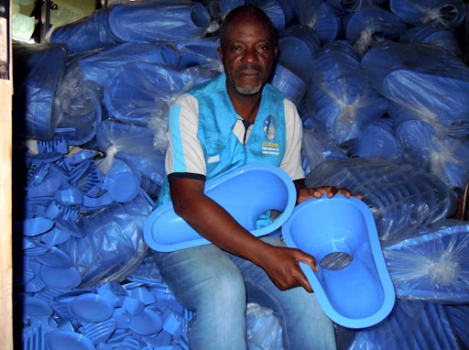
Photo credit: USAID/MuniWASH
Meet Ismaël Amouh. After a decades-long career as a plumber, today Ismaël is helping to transform the water and sanitation sector in the Ouémé District of Benin.
When Ismaël realized that the dire condition of the household latrines he was repairing discouraged customers from using them, his career took a turn. He saw an opportunity to make a difference by helping to improve household access to safe latrines. He started lining defecation pots with tiles to improve their appearance and functionality and soon received recognition in his community for pioneering the production and marketing of improved latrines.
Motivated to address water accessibility challenges faced by communities, Ismaël next ventured into constructing boreholes with pumps and reservoirs.
In Benin, where the open defecation rate still hovers around 50 percent, USAID supports entrepreneurs like Ismaël to develop, invest in, and expand their sanitation businesses to reach more households with latrines in their communities. In 2015, Ismaël participated in USAID’s Sanitation Service Delivery project, where he improved around 500 latrines and helped develop sanitation products for small entrepreneurs.
USAID’s West Africa Municipal Water, Sanitation, and Hygiene (MuniWASH) project further equipped him with construction techniques, sales strategies, and business management insights, enabling him to identify new opportunities and expand his operations. Now, Ismaël counts 20 sales sites in communities where individuals often have to travel long distances to find a toilet. Ismaël has also started importing and distributing SATO toilet pans. These toilet pans, engineered to flush with minimal water and create a more hygienic and safe latrine environment, are part of a broader initiative by USAID to expand the market for sustainable sanitation and hygiene solutions in the region.

Photo credit: USAID/MuniWASH
In a testament to his impact, Ismaël's community has affectionately dubbed him “WC Minim,” meaning the one who builds the best latrines (mimin means “clean” in the local Fon language).
Ismaël hopes to expand his impact on the sanitation sector over the long term and to one day help train and empower young people with the skills to pursue a career in the sanitation sector.
Related Resources:
- USAID West Africa Municipal Water, Sanitation, and Hygiene (MuniWASH) Activity Page
- USAID Rural Sanitation Technical Brief

About The Author
Alphonse Sego leads sanitation market development for USAID’s Municipal Water, Sanitation, and Hygiene (MuniWASH) Project. He has fifteen years of experience implementing development projects in the WASH sector in Benin and West Africa. He holds a Master’s degree in Infrastructure and Services Management, with a specialization in water and sanitation.


